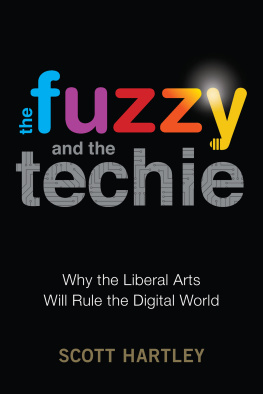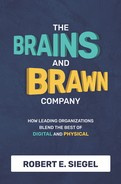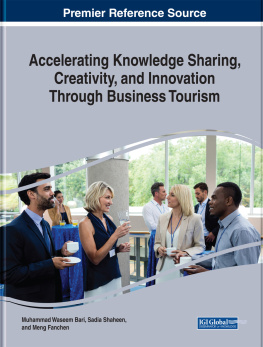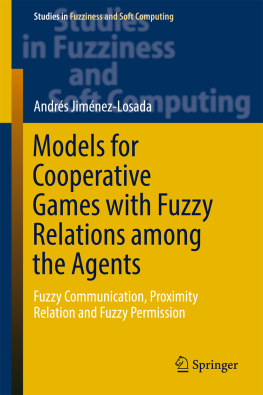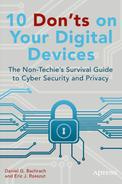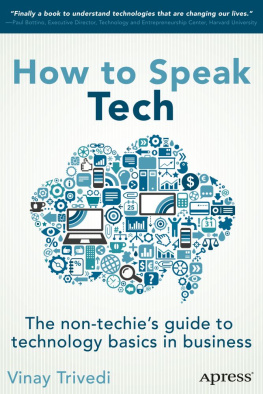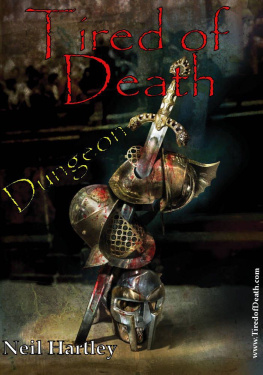Copyright 2017 by Hartley Global, LLC
All rights reserved
For information about permission to reproduce selections from this book, write to or to Permissions, Houghton Mifflin Harcourt Publishing Company, 3 Park Avenue, 19th Floor, New York, New York 10016.
www.hmhco.com
Library of Congress Cataloging-in-Publication Data
Names: Hartley, Scott (Business consultant)
Title: The fuzzy and the techie : why the liberal arts will rule the digital world / Scott Hartley.
Description: Boston : Houghton Mifflin Harcourt, 2017.
Identifiers: LCCN 2017000818 (print) | LCCN 2017001597 (ebook) | ISBN 9780544944770 (hardback) | ISBN 9780544944374 (ebook)
Subjects: LCSH : Creative ability in business. | Education, HumanisticSocial aspects. | TelecommunicationSocial aspects. | BISAC: BUSINESS & ECONOMICS / General. | BUSINESS & ECONOMICS / Careers / General.
Classification: LCC HD 53 . H 3765 2017 (print) | LCC HD 53 (ebook) | DDC 384.301/12dc23
LC record available at https://lccn.loc.gov/2017000818
e ISBN 978-0-544-94437-4
v1.0317
Cover design by Martha Kennedy
Graphs on are reproduced with permission from David J. Deming, originally published in the website summary of his 2016 paper, The Growing Importance of Social Skills in the Labor Market.
For my parents
Authors Note
The terms fuzzy and techie are used to respectively describe students of the humanities and social sciences (i.e., the fuzzies) and students of the engineering or hard sciences (the techies) at Stanford University. Beneath these lighthearted appellations rest some charged opinions on the relative value of each type of degree, on the importance of the direct vocational application of a college degree, and on the appropriate role of education. Not surprisingly, these are opinions that have bubbled well beyond the vast acreage of Stanfords palm-fringed quads and golden hillsides, into Silicon Valley, and into its metaphorical extension as the economic engine of todays economy.
The divide between fuzzies and techies is a modern incarnation of the chasm physicist and novelist Charles Percy Snow lamented had formed between those in the humanities and the sciences in his famous essay The Two Cultures. As Snow emphasized, those trained in the liberal arts and those trained in technology and the sciences have much value to share with one another and he advocated building bridges between them. Today, the assertion is widely made that those versed in the classical liberal arts are not well prepared for success in tomorrows technology-led economy because they do not have the requisite vocational skills in the science, technology, engineering, and math (STEM) disciplines. I will argue that, on the contrary, they have knowledge and skills that are vital to success in this fast-evolving economy.
This book seeks to reframe the debate about the value of a liberal arts versus a STEM education. While taking into account the very real need for more so-called STEM majors, this book seeks to highlight that the debate has turned on a faux opposition between STEM education and the liberal arts. Indeed, as we evolve our technology to make it ever more accessible and democratic, and as it becomes ever more ubiquitous, the timeless questions of the liberal arts, and their insights into human needs and desires, have become essential requirements in the development of our technological instruments.
As a fuzzy, I have grown up in a techie world. I have witnessed the need for collaboration between fuzzies and techies as a child in Palo Alto, as an undergraduate at Stanford, then as an employee of Google and Facebook, and thereafter as a venture capitalist on Sand Hill Road. If we peer behind the veil of our greatest technology, we will see that it is distinguished by its humanity. I have met with the founders of thousands of companies, and the truth is that no matter what youve studied, no matter what your background is, there is a very real and a very relevant role for you to play in tomorrows tech economy. As software eats the world, technology requires input and expertise from every corner of society. We need more techies in traditionally fuzzy institutions such as our government, and we need more fuzzies building tech companies. Our technology ought to augment rather than replace, and ought to provide us with great hope rather than great fear.
Finding solutions to our greatest problems requires an understanding of human context as well as of code; it requires both ethics and data, both deep thinking people and Deep Learning AI, both human and machine; it requires us to question implicit biases in our algorithms and inquire deeply into not just how we build, but why we build and what we seek to improve. Fuzzies and techies must come together and the true value of the liberal arts must be embraced as we continue to pioneer our new technological tools.
Scott Hartley
Fall 2016
ONE
The Role of the Fuzzy in a Techie World
One time she was Kate in The Taming of the Shrew. Another time she was Adelaide in Guys and Dolls. But on her own stage, Katelyn Gleason is the founder and CEO of Eligible, an innovative health-care technology company. A theater arts major at Long Islands Stony Brook University, she never anticipated that she would become an entrepreneur, let alone a tech entrepreneur. But after founding her own company when she was twenty-six years old, and raising $25 million in venture capital from some of the most successful entrepreneurs in American business, she credits her acting experience with contributing significantly to her social skills, confidence, and talent for sales, which were all instrumental in launching Eligible.
Katelyn became a health-tech entrepreneur by chance. She could have been a poster child for the argument against a liberal arts education made so often in recent years: that it doesnt prepare students for the jobs the economy needs filled. Indeed, once she determined that acting might not work out and that she should search for other work, she had no clear idea what kind of job to look for. She did know that she was very good at sales. During college she had supported herself by working as a sales director for a company that published a business directory.
Katelyn says that her acting experience helped with that work by teaching her how to be persuasive in her sales pitches, and also how to deal with the emotional impact of people telling her no again and again. Acting taught her how to quiet her self-doubt and forge ahead despite rejections. She proved so talented at selling that by the time she was twenty, she was managing a sales force of forty. As she looked for job openings in a wide-ranging job search, she was drawn to an advertisement on Craigslist for a job in sales for a web-based startup providing services for health care practices, called DrChrono. The company provided scheduling, billing, and order management for clinical tests and prescriptions. Despite knowing nothing about the health care industry, she knew sales, and she felt confident she could learn what she needed to know to get the job done.
DrChrono hired her as a contract salesperson, and Katelyn began learning about health care and about building a business. She discovered that she was fascinated by the process of innovating a business and loved being part of a small entrepreneurial team. The founders also loved having her. Her sales ability was so impressive that the founders asked her to join them in pitching the company at the highly competitive contest for startups held annually by Y Combinator (YC), a Silicon Valley startup incubator. Winning startups are admitted to a rigorous three-month program, during which time YC founder Paul Graham and a team of successful entrepreneurs and investors offer guidance about how to develop their businesses. DrChrono won a coveted spot, and Katelyn impressed Paul Graham so much that when she decided to leave DrChrono, he advised her that she should found her own health-tech startup, even though she didnt have fancy degrees from an Ivy League school or stellar connections like some of her peers.
Next page
